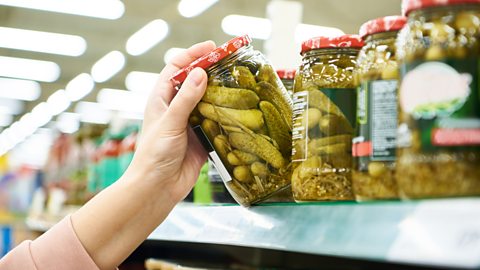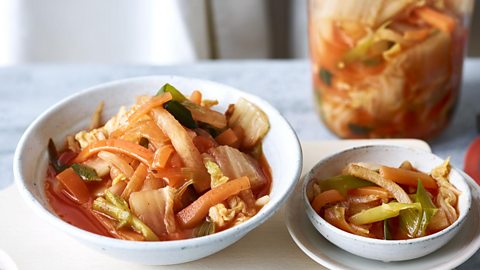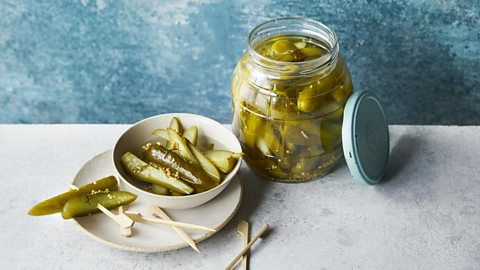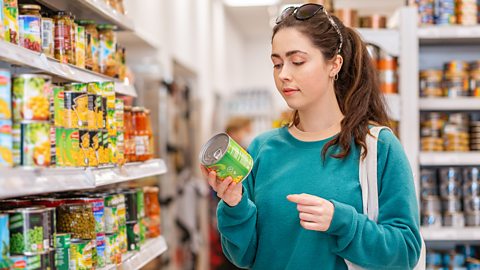Why are pickles suddenly so popular?
Once an oft-removed burger garnish, pickles have exploded in popularity lately. Here’s why we can’t get enough of them
By Imran Rahman-Jones

In October, singer Dua Lipa posted one of her most popular TikToks to date. It showed her loading up her diet cola with pickles and jalapeños.
It’s unsurprising the video went viral. Not only was the concoction, err, unusual – it also starred one of the latest internet food crazes.
Recently, pickles have become part of a wider food trend, their distinctive tart, tangy, fresh and savoury flavour getting people excited.
Even sportspeople such as England’s Kieran Trippier and Wimbledon champion Carlos Alcaraz have been spotted drinking pickle juice during matches (more on the reasons why later).
It’s perhaps unsurprising then, that many UK retailers say there’s been a noticeable uptick of pickles in shoppers’ baskets over the past year. “Pickle sales have seen a remarkable 16% year-on-year increase,” says Ocado Retail’s Meri La Bella.
Similarly, Waitrose says sales have risen “by nearly a fifth” and searches for “pickle” on its site have gone up 123% in the past year.
Shops have had to adapt to demand, with Tesco telling us it has increased the range of pickles and fermented food it stocks by two-thirds in the past year.
It’s not just supermarket shelves which have been responding to the pickle craze. Meal kit service Gousto has been putting more pickled foods in its recipe boxes given the demand. Now, two recipes per week feature pickled foods.
What, exactly are pickles?
When we talk about pickles, perhaps most of the time we’re referring to the small, preserved cucumbers that come in jars, often flavoured with dill and served inside diner-style burgers. Of course, there are loads of other vegetables that can be pickled, too.
There are two main ways to pickle vegetables: store them in vinegar, or ferment them in brine.
“With vinegar pickles, we add acid to the vegetables in order to preserve them, whereas with fermented pickles, the acid is produced naturally by the vegetables,” says Nick Vadasz, also known as the Picklesman, who started his pickle business in 2011.
An easy way to distinguish between the two at the shops is that vegetables pickled in vinegar will be in the ambient shelves, whereas naturally fermented vegetables will live in the chilled aisles.
What started the pickle craze?
Fermentation expert Ruth Munro of the Edinburgh Fermentarium runs courses on fermented pickles and says they’re getting more popular for three main reasons.
Firstly, people are looking for ways to prevent food waste. Pickling vegetables is a way of preserving them, meaning you can keep them for longer without them going off.
Secondly, Munro thinks we are more adventurous with flavour nowadays. “East Asian food, [especially] Korean food has become very popular,” she says.
Fermented food such as kimchi and gochujang have long been common in East Asia, but are still relatively recent to the UK. (Vadasz says kimchi is now his bestseller.)
But Munro thinks the number one reason people are interested in her courses is because of awareness around the perceived health benefits. Vadasz agrees, saying there has been “a huge amount of media coverage” around this.
Kimchi
Kimchi’s said to be great for your gut health

Are pickles good for health?
There’s growing research that fermented pickles are good for gut health. Fermented foods are said to be beneficial for the microbiome – the microorganisms which live inside your body – as it’s believed they encourage good bacteria to thrive in your gut.
But what about vinegar pickles?
Sadly, an internet rumour – that pickle juice helps with hangovers – is not backed by science. We’re still on the lookout for a miracle cure for that.
But there may be some benefits in sport. Some professional athletes have started drinking pickle juice during matches to help alleviate cramping – a painful involuntary contracting of the muscles. As well as in football and tennis, it’s been gulped by players in cricket, rugby and American Football games too.
Dill pickles
Could the juice from your jar of pickles stop those mid-match cramps?

These sportspeople aren’t just clutching at straws to help their performance. Kevin C Miller, professor in the department of health and human performance at Texas State University, has conducted studies which found drinking a few gulps of pickle juice does indeed help with muscle cramping.
“Pickle juice shortened how long the cramps lasted for our subjects by about 40%,” he says.
“We knew from several studies it wasn’t the sodium, it wasn’t the electrolytes, or anything that’s in the blood,” continues Prof Miller. This is because the effect is too fast for anything in the juice to be absorbed into your body.
What Prof Miller proposes instead is that it’s down to the taste. When the strong, acidic flavour hits your mouth, it acts as a shock to the body.
This breaks a feedback loop between your brain and the muscle, which has been causing the cramping to continue. In theory, this means taking on any strong-flavoured substance could work – Prof Miller says that in Texas, he has seen chilli hot shots, as well as pickle juice, marketed as sports drinks.
But it’s worth pointing out Prof Miller’s studies showed less than 100ml of pickle juice did the trick. So, no need to go to your next sports game with a whole jar.
How to eat pickles
The fresh, tangy flavour of pickles works will with rich foods – which is why you’ll often find cornichons served with cheese and meats, and sliced gherkins in burgers and hotdogs.
Pickled vegetables also work well in (or on the side of) stir fries or rice dishes,” says Vadasz.
Then once you have finished your jar, the liquid can be used in soups or salad dressings, or even blended into a mayonnaise, he says. Whenever you need a little kick of acidity, pickles can help.
Originally published April 2025
Want more? Visit BBC Food on Instagram, Facebook and Pinterest or watch the latest Food TV programmes on BBC iPlayer.



